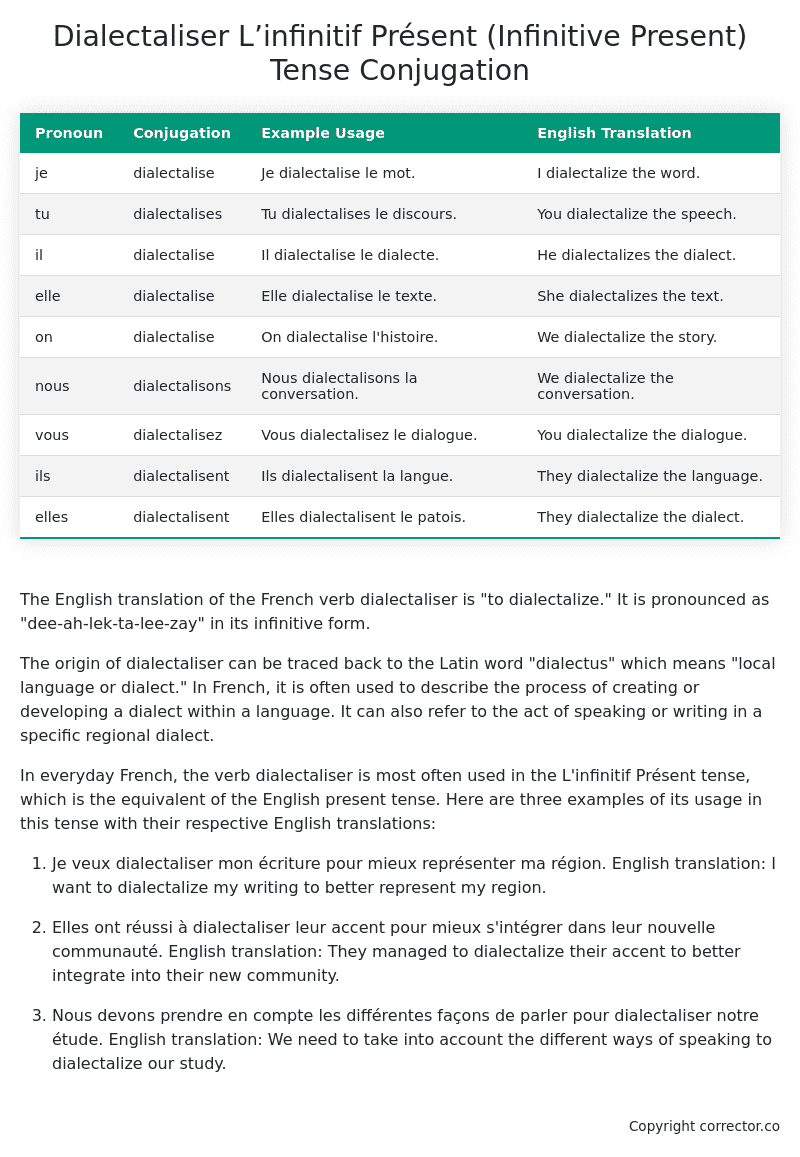L’infinitif Présent (Infinitive Present) Tense Conjugation of the French Verb dialectaliser
Introduction to the verb dialectaliser
The English translation of the French verb dialectaliser is “to dialectalize.” It is pronounced as “dee-ah-lek-ta-lee-zay” in its infinitive form.
The origin of dialectaliser can be traced back to the Latin word “dialectus” which means “local language or dialect.” In French, it is often used to describe the process of creating or developing a dialect within a language. It can also refer to the act of speaking or writing in a specific regional dialect.
In everyday French, the verb dialectaliser is most often used in the L’infinitif Présent tense, which is the equivalent of the English present tense. Here are three examples of its usage in this tense with their respective English translations:
-
Je veux dialectaliser mon écriture pour mieux représenter ma région.
English translation: I want to dialectalize my writing to better represent my region. -
Elles ont réussi à dialectaliser leur accent pour mieux s’intégrer dans leur nouvelle communauté.
English translation: They managed to dialectalize their accent to better integrate into their new community. -
Nous devons prendre en compte les différentes façons de parler pour dialectaliser notre étude.
English translation: We need to take into account the different ways of speaking to dialectalize our study.
Table of the L’infinitif Présent (Infinitive Present) Tense Conjugation of dialectaliser
| Pronoun | Conjugation | Example Usage | English Translation |
|---|---|---|---|
| je | dialectalise | Je dialectalise le mot. | I dialectalize the word. |
| tu | dialectalises | Tu dialectalises le discours. | You dialectalize the speech. |
| il | dialectalise | Il dialectalise le dialecte. | He dialectalizes the dialect. |
| elle | dialectalise | Elle dialectalise le texte. | She dialectalizes the text. |
| on | dialectalise | On dialectalise l’histoire. | We dialectalize the story. |
| nous | dialectalisons | Nous dialectalisons la conversation. | We dialectalize the conversation. |
| vous | dialectalisez | Vous dialectalisez le dialogue. | You dialectalize the dialogue. |
| ils | dialectalisent | Ils dialectalisent la langue. | They dialectalize the language. |
| elles | dialectalisent | Elles dialectalisent le patois. | They dialectalize the dialect. |
Other Conjugations for Dialectaliser.
Le Present (Present Tense) Conjugation of the French Verb dialectaliser
Imparfait (Imperfect) Tense Conjugation of the French Verb dialectaliser
Passé Simple (Simple Past) Tense Conjugation of the French Verb dialectaliser
Passé Composé (Present Perfect) Tense Conjugation of the French Verb dialectaliser
Futur Simple (Simple Future) Tense Conjugation of the French Verb dialectaliser
Futur Proche (Near Future) Tense Conjugation of the French Verb dialectaliser
Plus-que-parfait (Pluperfect) Tense Conjugation of the French Verb dialectaliser
Passé Antérieur (Past Anterior) Tense Conjugation of the French Verb dialectaliser
Futur Antérieur (Future Anterior) Tense Conjugation of the French Verb dialectaliser
Subjonctif Présent (Subjunctive Present) Tense Conjugation of the French Verb dialectaliser
Subjonctif Passé (Subjunctive Past) Tense Conjugation of the French Verb dialectaliser
Subjonctif Imparfait (Subjunctive Imperfect) Tense Conjugation of the French Verb dialectaliser
Conditionnel Présent (Conditional Present) Tense Conjugation of the French Verb dialectaliser
Conditionnel Passé (Conditional Past) Tense Conjugation of the French Verb dialectaliser
L’impératif Présent (Imperative Present) Tense Conjugation of the French Verb dialectaliser
L’infinitif Présent (Infinitive Present) Tense Conjugation of the French Verb dialectaliser (this article)
Struggling with French verbs or the language in general? Why not use our free French Grammar Checker – no registration required!
Get a FREE Download Study Sheet of this Conjugation 🔥
Simply right click the image below, click “save image” and get your free reference for the dialectaliser L’infinitif Présent tense conjugation!

Dialectaliser – About the French L’infinitif Présent (Infinitive Present) Tense
Forming the Infinitive Present
Common Everyday Usage Patterns
As a Verb’s Dictionary Form
After Modal Verbs
As an Imperative
In Infinitive Clauses
Interactions with Other Tenses
Present Tense
Future Tense
Conditional Tense
Passé Composé
Imperfect Tense
Subjunctive and Conditional Moods
Summary
Want More?
I hope you enjoyed this article on the verb dialectaliser. Still in a learning mood? Check out another TOTALLY random French verb conjugation!


